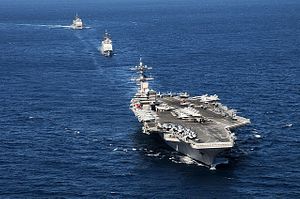In his important new book Restraint: A New Foundation for U.S. Grand Strategy, Barry R. Posen raises one more call for restraint, although he reaches this conclusion in a distinct way uniquely his own. Posen finds that the United States has fallen prey to the illusion that it can – indeed, is being called upon to – bring to the nations of the world a democratic, stable form of government and a prosperous way of life to boot. He calls this thesis “liberal hegemony” and points out that its experiences in Vietnam, Iraq and Afghanistan should have made the United States realize that it cannot make this vision come true. The United States should therefore stop all its efforts at coercive state- and nation-building and limit its overseas interventions to those situations in which its major national interests are involved.
Showing such restraint would have major side benefits, according to Posen. He finds that many of the United States’ allies, especially the European countries and Japan, are currently “free-riders” that spend little on defense and rely on the United States to protect them. Cutting back on commitments to these nations, for instance by removing U.S. forces from their territories, would make them shoulder more of the burden. This self-imposed restraint would also rein in what Posen calls “reckless drivers,” especially Israel, that take undue risks because they assume that the United States will bail them out if they get into serious trouble.
Posen holds that the United States faces three challenges. One is the rise of China, which he views as much less of a threat than do several other observers. He points to the internal difficulties China faces and sees its ambitions as largely limited to the Asia-Pacific region, although in an aside he notes that ambitions of nations tend to rise as their capacities do. A second challenge Posen recognizes is the spread of nuclear weapons, and a third is terrorism.
Posen argues that the United States should deal with all these threats by maintaining sufficient military force to preserve “control of the global commons”: the seas, the air, space, and cyberspace. However, this could be achieved through greatly cutting the Army and somewhat building up the other branches of the military, which could allow the United States to reduce its defense budget from about 4.5 percent to 2.5 percent of GDP. The funds saved could be relegated to domestic buildup, which President Barack Obama, who seems also to be a champion of restraint but for political reasons cannot use the term, calls “nation-building at home.”
Readers may note that Posen has not escaped the challenge of all who write such books: that the world changes by the time books are printed, distributed, reviewed, and read, which still takes about as long as it did 30 years ago. Posen’s call to remove U.S. troops from the Middle East, in order to reduce the number of targets that terrorists could attack, must now be squared with the threat posed by the Islamic State, also known as ISIS or ISIL. The Islamic State has already forced the restrained U.S. president to re-commit American forces to the region. In effect, as I see it, the Middle East and Africa, not East Asia, remain the main challenges to U.S. security.
Above all, the United States must worry about terrorists gaining small nuclear weapons one way or another, especially in Pakistan, and because jihadist groups with different names but similar fanaticism are popping up all over. I see no evidence that these forces can be “destroyed” in the foreseeable future, nor that the United States can bring about the political, social and economic changes – and, above all, cultural changes – that would end this threat. Dealing with these terrorist groups may well require considerable increases in special forces and a sizeable army to provide air and artillery support, transportation, supplies, and intelligence. This would be a major and, I suggest, much-needed reversal of the current approach: Special forces would be the main player, and the Army would serve as a platform, as opposed to using special forces as a sideshow or, indeed, as a “special” force. (I guess I should disclose that I served in the special forces, though in my days they were called “commandos”).
Otherwise, I see a great deal of merit in Posen’s call for restraint. His focus on United States self-restoration dovetails well with the call for mutual restraint from the United States and China articulated by James Steinberg and Michael E. O’Hanlon in their valuable book Strategic Reassurance and Resolve: U.S.-China Relations in the Twenty-First Century. It provides additional support for the call for Mutually-Assured Restraint made by a group of American and Chinese public intellectuals and championed by myself. None of these scholars or books calls for endangering the United States’ core interests or those of other nations. They merely favor understanding that the leverage of even the most powerful nations is limited and that these powerful nations should therefore choose carefully when to commit their military forces, and they above all seek mutually beneficial solutions that do not rely on the use of force. This is what restraint is all about.
Amitai Etzioni is a university professor and professor of international relations at The George Washington University. He served as a senior adviser to the Carter White House and taught at Columbia University, Harvard University, and the University of California at Berkeley. His latest book is The New Normal: Finding a Balance between Individual Rights and the Common Good.

































